River Raisin Ragtime Revue preserving the past, growing its presence in Lenawee County
TECUMSEH — In the past couple of years, the River Raisin Ragtime Revue has been more visible in its home county, particularly as it renovates the former Adrian Training School chapel into its home venue.
R4’s 13-member orchestra performs 15-20 concerts a year across the region, from churches and retirement communities to Greenfield Village in Dearborn. For the past two years, the ensemble has hosted its Ragtime Extravaganza in July at the PlaneWave Instruments campus, where the chapel, now called Haviland Hall, is located. Along with R4’s headlining performance, the extravaganza includes local bands and organizations and closes with fireworks.
Once Haviland Hall, named for abolitionist and educator Laura Smith Haviland, is completed, R4 will be able to move its office from founder William Pemberton’s home in Tecumseh and host more performances.
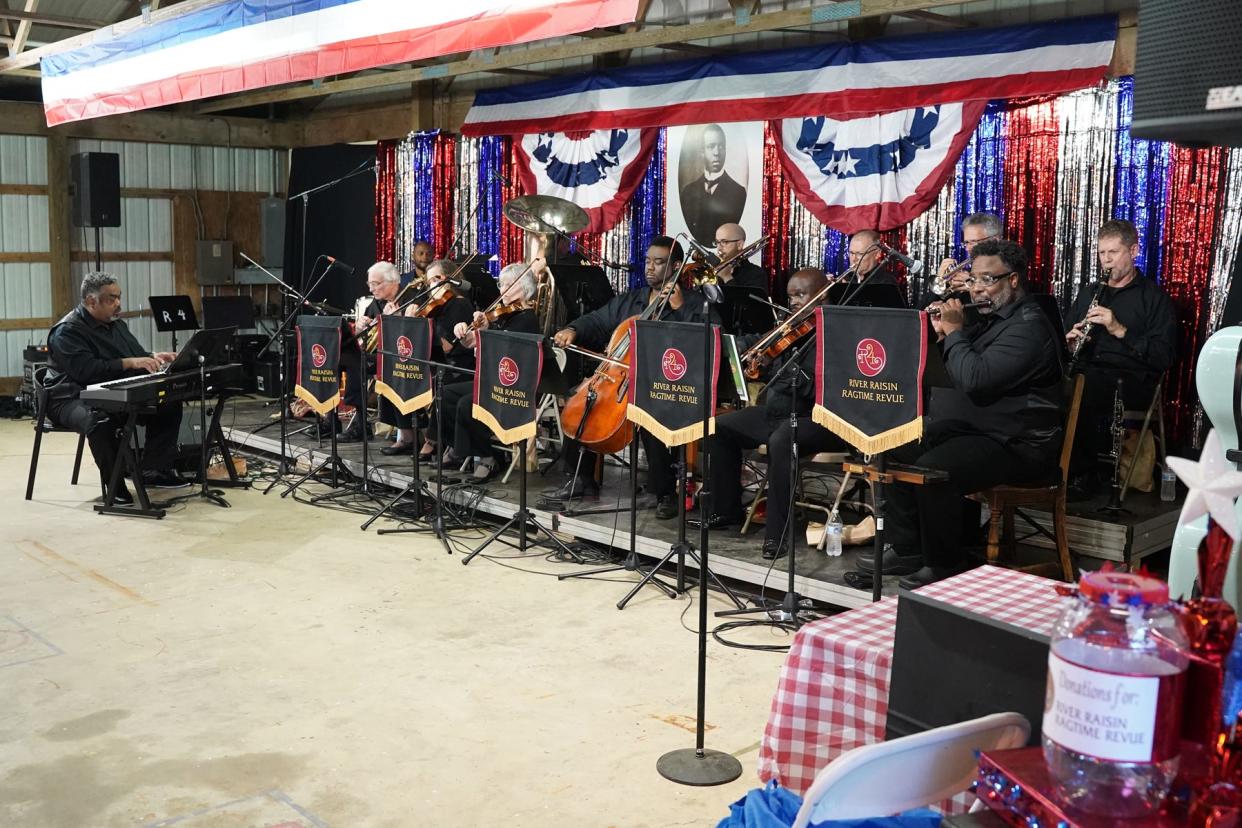
Pemberton’s interest in ragtime music began when he was a music student at the University of Michigan in Ann Arbor, but the connections that led to the formation of R4 go back to his youth in northern Michigan.
As a student at U-M, Pemberton was introduced to ragtime music when the band he was in, conducted by graduate student Larry Rachleff, played a collection of some of the earliest published rags. Pemberton attended U-M after graduating from Interlochen Arts Academy near Traverse City. He attended Interlochen after meeting William Hayes, a music instructor from the Traverse City schools who would travel to Pemberton’s hometown of Cadillac to conduct the Cadillac Philharmonic, a community ensemble. As a sixth grader in the 1970s, Pemberton wanted to play in the Cadillac Philharmonic, but the school district wouldn’t let him take his school-owned tuba away from school. Hayes loaned him a tuba so he could play with the group.
Pemberton grew up poor, so Hayes would collect money in the community to help Pemberton go to auditions to further his musical experience.
About 20 years later, in 2001, Pemberton was starting the River Raisin Ragtime Revue and learned Hayes was teaching in the Ypsilanti schools.
“I wanted to find someone to lead R4,” said Pemberton, who is white. “And I knew that the music, you know, had rich African American roots. It's a really strange genre that not very many people play. … And so there's not a lot of reference for style, where to go to really hear it and I knew that William Hayes had several things going for him. He was a great composer and arranger, so a lot of the music I knew would be missing parts, as I started to collect orchestrations, I knew that he'd be able to create new parts. Since then, he has edited hundreds of scores for us.”
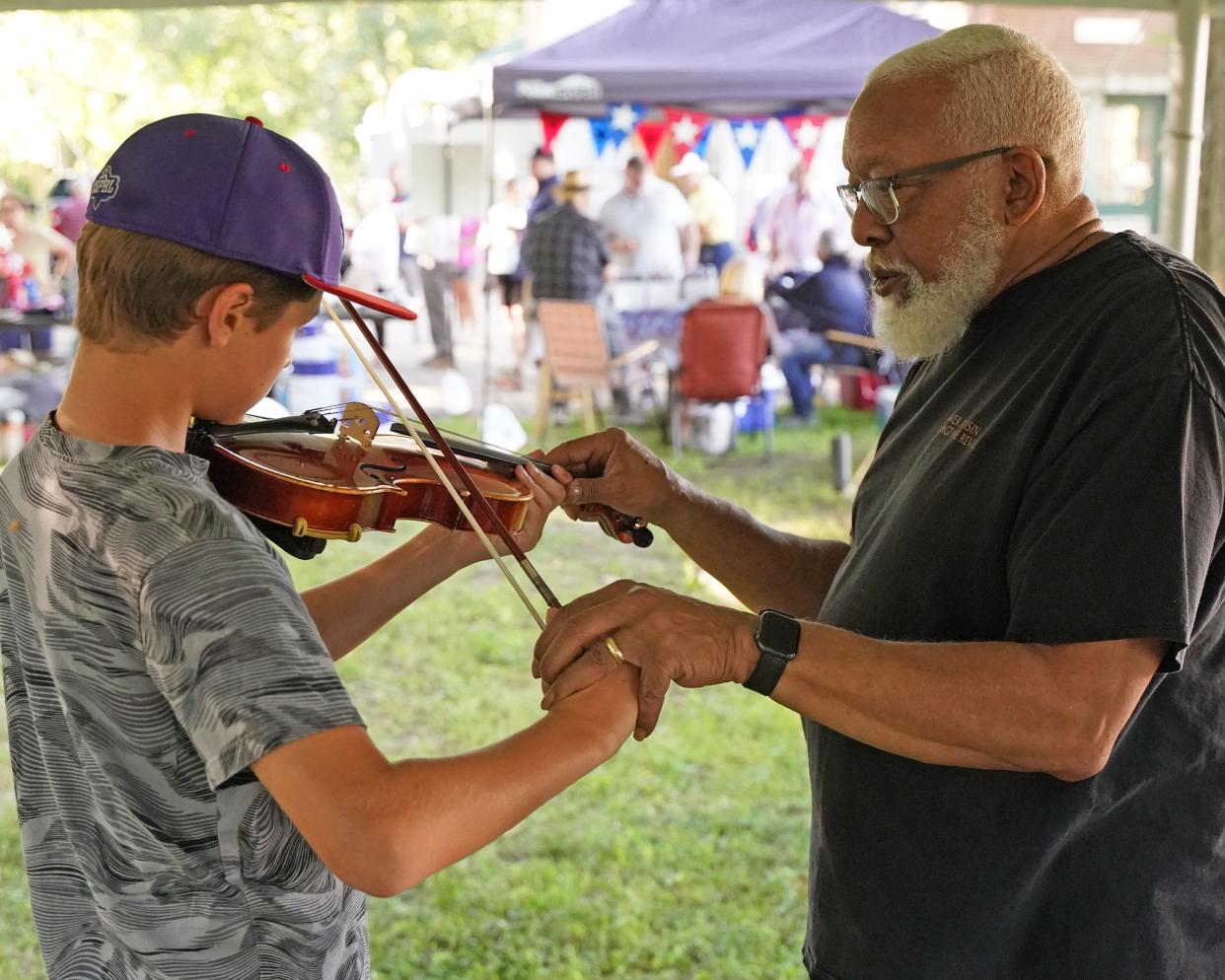
Hayes, who is Black, also played bass in a jazz trio and had a way of describing music as a language, so Pemberton knew that Hayes could handle writing a variety of musical styles and explaining it to musicians.
Because a lot of ragtime was written and performed in the late 1800s and early 1900s by Black pianists in bars and bordellos in the Midwest just as cylinder phonographs were becoming common, there’s missing information about playing styles. Also, printed scores that have survived to today can be incomplete, which is where Hayes’ composing and arranging skills help fill in the blanks.
“Often the rag would be published as a piano solo, and at the same time it was published with an orchestration,” Pemberton said. “… So I knew that Bill was familiar with these different styles as we started to try and figure out the appropriate interpretation for this music.”
Early recordings of ragtime are usually by larger orchestras.
“It's not like a group of African American amateur musicians from Sedalia (Missouri) are going to be putting down vinyl records,” Pemberton said.
It wasn’t until James Reese Europe and his Society Orchestra recorded with the Victor Talking Machine Co. in 1914 that ragtime recordings in a Black vernacular became widely available.
Ragtime really took off in popularity with the publication of Scott Joplin’s “Maple Leaf Rag” in 1899 and remained America's most popular music until the 1920s when jazz surpassed it. John Stark, a music publisher in Sedalia, promoted ragtime as being on par with classical music at a time when a lot of musicians looked down on African American rags, Pemberton said.
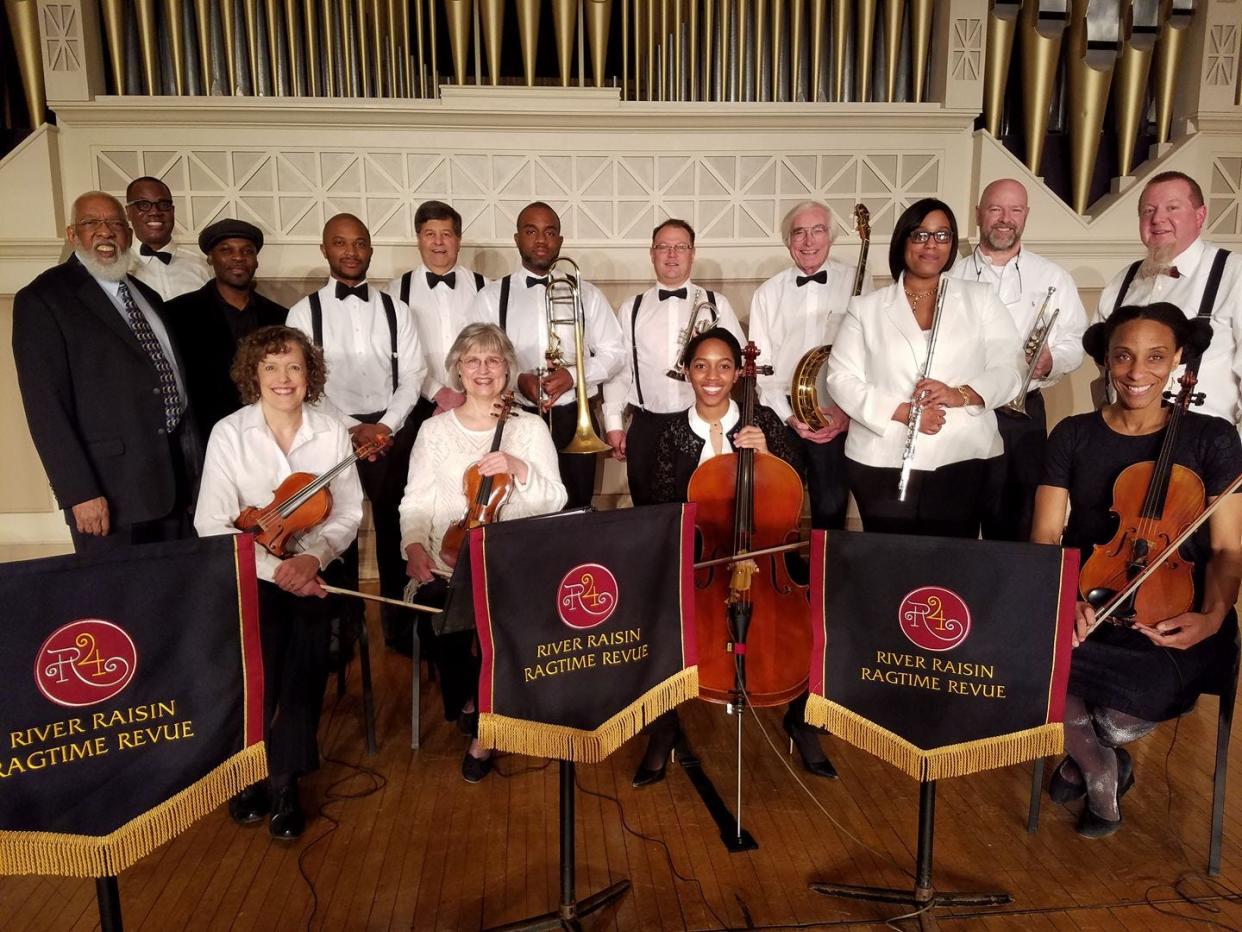
Stark’s “15 Standard High-Class Rags” was a collection of the greatest hits of some of the biggest ragtime composers of the time: Joplin, Maurice Kerwin, James Scott, Joseph Lamb, J. Russel Robinson and Arthur Marshall. Seven of those rags, by Joplin, were recorded in an album called “Scott Joplin: The Red Back Book” by the New England Ragtime Ensemble conducted by Gunther Schuller.
Those seven rags were in that concert that Pemberton played in as a U-M student that drew him to ragtime.
R4’s first album, “The Red Back Book,” is the only complete recording of Stark’s “15 Standard High-Class Rags.” R4 partnered with the Historic New Orleans Collection to recreate the rags.
Pemberton got the idea to start a ragtime group in 2001. He was the president of the Tecumseh Area Historical Society then as it hosted a traveling Smithsonian Institution exhibit, “Yesterday’s Tomorrows,” about how people in the past envisioned how the future would be. He liked how the exhibit was interactive in that the community could contribute items to be displayed.
“I thought concerts should be this way, concerts should be interactive,” he said. “People shouldn't just go to Hill Auditorium and sit in the seat and read a few program notes, if they have the time to do that and hear this music played.”
He also had an interest in lesser-known aspects of history.
“I think growing up poor, when I studied history … I always kind of was interested in the history of the less documented,” he said.
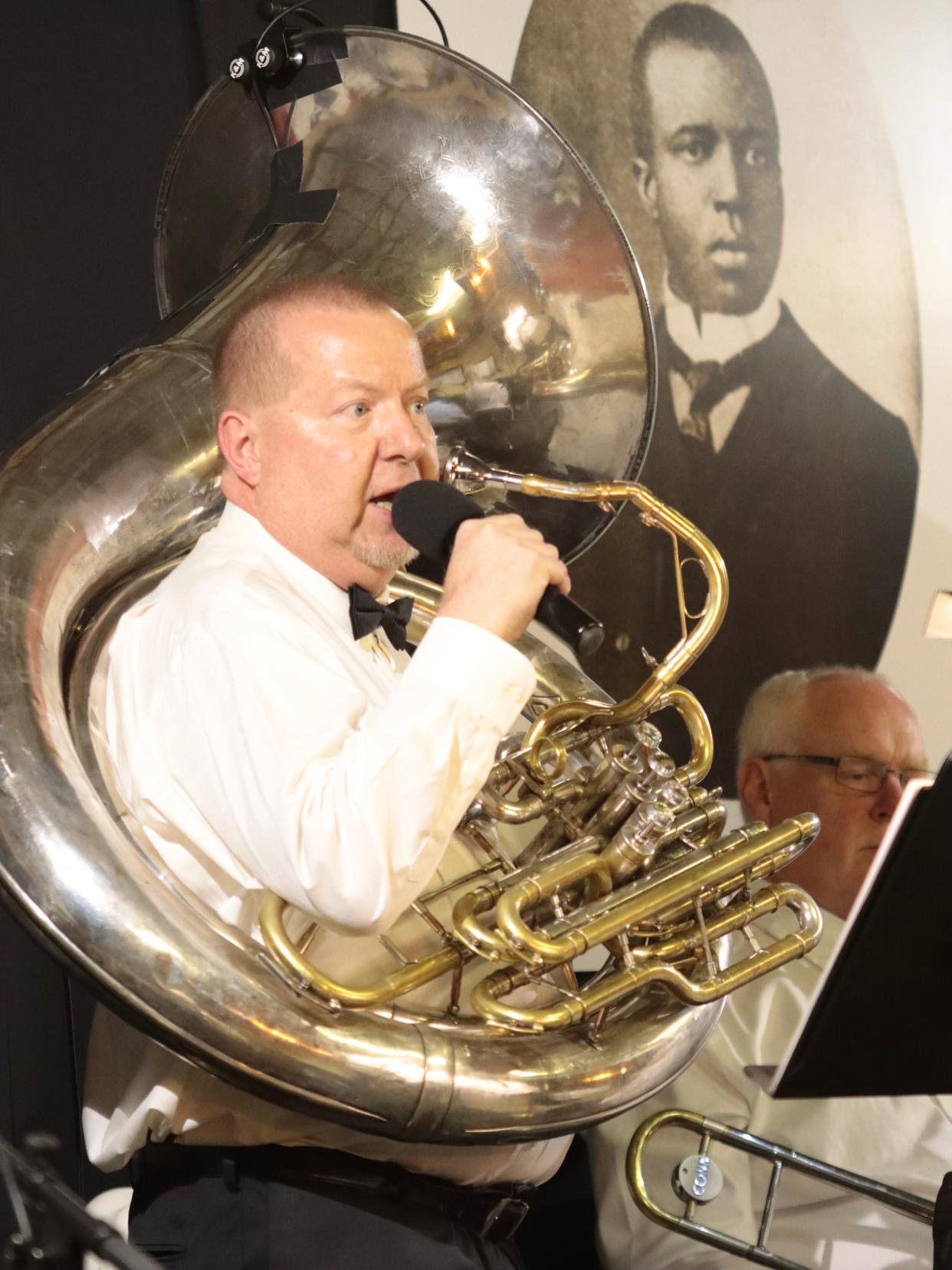
Those thoughts, to present interactive performances of ragtime, were the genesis of R4. Now, when R4 performs, Pemberton shares well-researched stories of the composers and the pieces they play in narratives that are tailored to their audience.
Pemberton said he hopes that R4’s audiences enjoy themselves.
“Inside, I'm hoping they learn a little bit more about the origins of American popular music, but I don't want them to necessarily really know that they’re learning,” he said with a laugh. “I try to make the narratives a part of the flow of the program, I want to give people enough to think about something and get right back into another piece.”
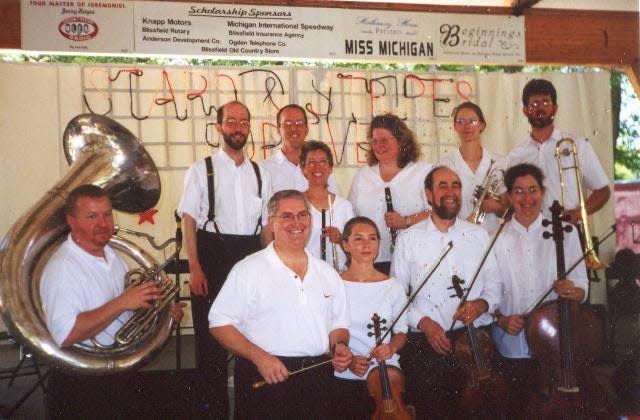
R4’s first performance was in February 2002 at an antique appraisal fair put on by the Tecumseh Area Historical Society at the former community center, now the Hayden-Ford Mill Building next to Globe Mill Pond.
“I invited the orchestra down there, and we played,” he said. “We just sight read, basically, ‘The Red Back Book,’ those Gunther Schuller arrangements that I had purchased. And it was fun.”
Someone from the River Raisin Festival in Blissfield then invited R4 to play there that summer.
“Our tent was right next to the tractor pull,” Pemberton said. “It was quite a competition. I think we lost. So those were our very first two gigs, and then we started playing some concerts in Ann Arbor. We played at a Lutheran church there and kind of took off from there.”
Subscribe Now: For all the latest local developments, breaking news, and high school and college sports content.
R4 then began a relationship with Greenfield Village that continues today. They’ve worked with U-M, Eastern Michigan University and Central Michigan University on projects. R4 also has partnered with the Sphinx Organization, a Detroit-based social justice organization that focuses on increasing representation of Black and Latinx artists in classical music, to further educate about ragtime's roots and recognize Black composers' contributions.
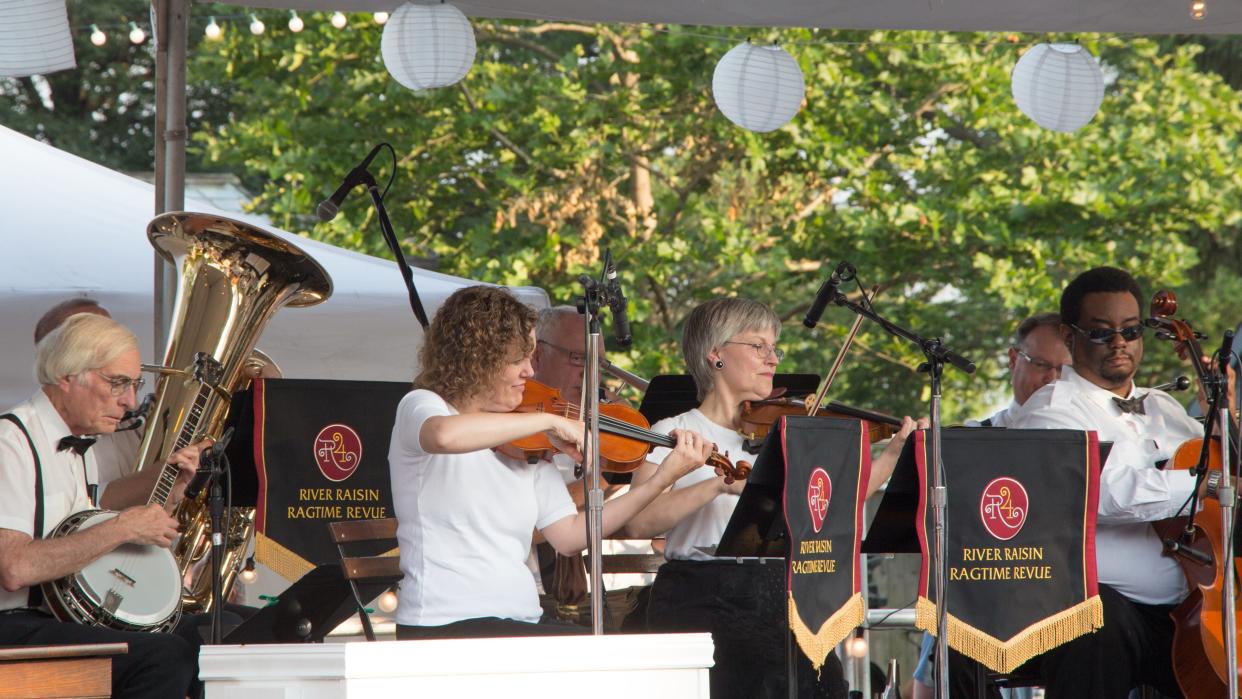
In most years, R4 does about 15 performances, though 2023 has been busier with about 20. Pemberton said that might be from pent-up demand after the COVID-19 pandemic curtailed their schedule.
Early on, R4 was primarily made up of musicians from U-M who Pemberton knew from school. Now their roster consists of college faculty members and musicians who play with groups such as the Ann Arbor Symphony Orchestra, the Detroit Opera and Detroit Symphony Orchestra. R4 pays each musician $150 per rehearsal or performance plus a travel fee.
The instruments they play are correct for the ragtime era, with the possible exception of percussion where their drummer might use a contemporary drum kit. They’re trying to play what would have been a Midwestern style that an orchestra from Detroit might have played around 1910, Pemberton said.
Looking ahead, Pemberton said he would love to have R4 tour across the country or even to Europe. And when Haviland Hall is finished, it could be the center of a larger ragtime event.
“We would love to have a ragtime festival in Adrian,” he said. “It's the Maple City. Call it the Maple Leaf Ragtime Festival, which is perfect. I think that people already travel to Sedalia for the Scott Joplin International Festival. They travel to Sutter Creek in California. … I think they would travel if there were a gathering of big-name people there on campus.”
— Contact reporter David Panian at dpanian@lenconnect.com or follow him on X, formerly Twitter: @lenaweepanian.
This article originally appeared on The Daily Telegram: River Raisin Ragtime Revue preserves past in Lenawee County
